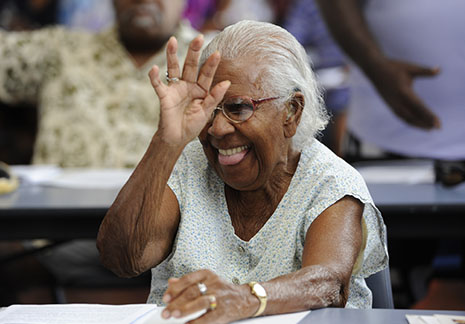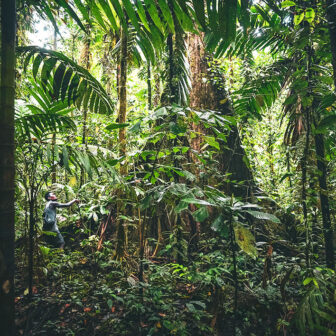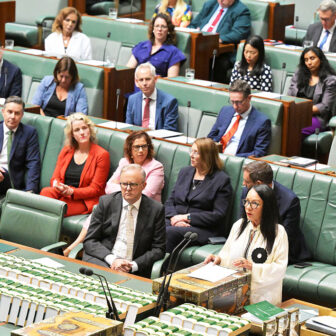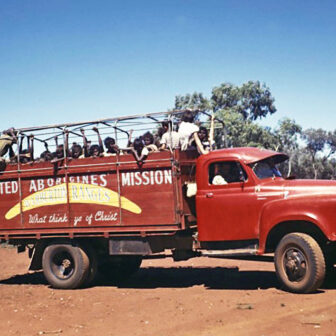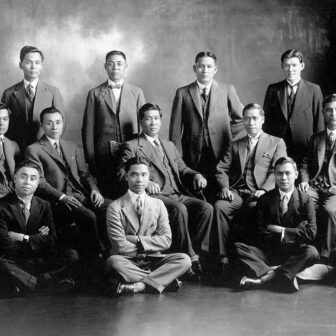CHIEF David Fadanumata hails from the island nation of Vanuatu, but he has a tale to tell that links Australian Indigenous communities and their Pacific neighbours.
In colonial Australia, industries like sugar cane and cotton relied on islanders recruited – or kidnapped – from across Melanesia. Between 1863 and 1904, more than 60,000 Melanesians were brought to work in fields and farms across Queensland and northern New South Wales. While many Australians have heard of this practice – known as blackbirding – few know what happened to the descendants of these indentured workers.
I met Chief David in Port Vila outside the offices of the Malvatumauri, the national council of chiefs that links customary leaders from across the country. Speaking in Bislama, he told me how the history of blackbirding provides a link between Australia and peoples across the region: “It was people from all over the Pacific who were kidnapped and deported, so it is people from all over the Pacific who should come together.”
Known as “blackbirding,” this colonial labour trade was notorious for false promises and the mistreatment of the workers known as Kanakas (a Polynesian word for human being). Missionaries denounced the blackbirders as slavers and campaigned against the kidnapping of villagers from their islands. In spite of 1868 legislation to protect indentured workers, there was ongoing abuse of islanders and poor conditions in the cotton fields and cane farms.
The labour trade separated families and communities not only in the islands, but also in Australia. After 1901, the newly formed federation began deporting Pacific workers under the White Australia policy.
Last April, a major conference was held in Bundaberg, Queensland to unite the descendants of these labourers, who came mainly from the New Hebrides and Solomon Islands, but also from Fiji, New Caledonia, Papua New Guinea and many other locations in the region. The Wantok 2012 conference in Bundaberg brought together the descendants of those who remained – known today as Australian South Sea Islanders, or ASSI – from around Australia, as well as a large delegation of customary leaders and descendants’ families from Vanuatu led by MPs Ralph Regenvanu and Abel David. The conference featured a moving reconciliation ceremony, as chiefs from Vanuatu revealed the hidden history of past atrocities and sought to rebuild links across Oceania.
BLACKBIRDING began to wind down in the late 1890s amid the widespread agitation for an end to “cheap coloured labour” as the British colonies in Australia moved towards federation. The Pacific Island Labourers Act of 1901 banned recruitment after 1903 and gave authorities the power to deport any islander found in Australia after December 1906.
Thousands of indentured labourers who hadn’t returned home at the end of their contract were deported between 1904 and 1914. But more than 2000 people remained in Australia – mainly around Mackay and other towns in north Queensland – hiding from the authorities and often marrying into Aboriginal communities. By the 1960s, descendants of these Melanesian workers could obtain housing from the Aboriginal and Islander Advancement Corporation, but access to education was inadequate and South Sea Islanders became one of the poorest groups in Australia.
Although many white Australians regarded them as Aborigines, ASSI did not have land rights and were not eligible for the benefits given to Indigenous people unless they denied their South Sea Islander origins. By the 1990s, they were still disadvantaged in health, education, employment and home ownership, with unemployment rates two-and-a-half times the national average.
For decades, South Sea Islanders have been campaigning to put their issues on the agenda in Australia. In January 1975, community leaders established the Australian South Sea Islander United Council, and activists like Patricia Corowa and Nasuven Enares lobbied for recognition of ASSI as a distinct group.
A breakthrough came with a 1992 inquiry by the Human Rights and Equal Opportunity Commission. The Wantok 2012 conference came on the twentieth anniversary of the inquiry’s report, which recommended that South Sea Islanders be formally recognised as a distinct disadvantaged group and be given access to health and welfare schemes similar to those for Aboriginals and Torres Strait Islanders.
The federal government accepted these recommendations in 1994, though recognition came later in Queensland, where much of the ASSI community still live. It was only in July 2000 that the state government formally recognised South Sea Islanders as a distinct group and acknowledged their contribution to Queensland’s development. Today, ASSI activists argue that formal recognition of their community has not translated into real action by Commonwealth and state governments.
“Because recognition has been lying dormant for so long, there has not been much progress,” says Emelda Davis, President of the Australian South Sea Islanders Port Jackson branch and one of the organisers of the Wantok 2012 conference. “Queensland have been slowly moving different initiatives and funding for ASSI,” she adds. “But our new initiative is going to give communities in other states the ability to develop an action plan. This will address the situation in each state, providing access and equity for all South Sea Islanders across the country.”
Davis believes that it is important to build a national body to link ASSI communities across Australia. “As it is now, we’re fragmented with individual voices and the governments aren’t listening,” she says. “We need a national body so governments will sit up and take notice because they’re dealing with a nation. Queensland has been at the forefront but we’ll still need a national voice that can give us action in all areas: in the national education curriculum, in health and well-being, in things that will give our youth opportunities.”
The Bundaberg conference unanimously adopted a call to establish a new national body to represent Australian South Sea Islanders. According to the resolution, the new organisation would take “an essential role in advocating for the recognition and protection of the human rights of ASSI people. It will provide a mechanism to give meaning to and pursue the exercise of our rights. This includes recognising our right to determine our political status and pursue our economic, social and cultural development.”
Conference speaker Ralph Regenvanu, MP for Port Vila and former Vanuatu justice minister, says this was a key outcome of the gathering: “The fact that the vote for a national body was unanimous represents the feeling of grievance amongst that community – a feeling that their history in Australia hasn’t been recognised adequately. A recurring theme at the conference was that recognition has been a word but nothing much has happened since.”
ONE complex issue facing ASSI communities is their relationship to Aboriginal and Torres Strait Islander peoples. Emelda Davis acknowledges the widespread intermarriage between ASSI and Indigenous peoples in Australia, but says South Sea Islanders are proud of their heritage. “We have a strong connection with Aboriginal and Torres Strait Islander communities,” she told me, “but it’s really important to recognise the history of South Sea Islanders and what they’ve contributed to Australia and its primary industries.”
In February 2008, the Australian government formally apologised to the Stolen Generations, the Indigenous people who were separated from their families by government, church or welfare agencies. The descendants of South Sea Islanders have also lost contact with families, clans and communities in Melanesia. Over the past decade, there have been many efforts to establish links with relatives in Vanuatu, New Caledonia and Solomon Islands, as Australian-born islanders seek to learn about their cultural identity.
“There are groups from Queensland and New South Wales that have been going back to Vanuatu and reconnecting families. There’s been great work done by Sonia Minniecon trying to get communities to reconnect with families back home,” Davis says. “Aboriginals and Torres Strait Islanders have a program called Link Up to help with family reunion, and a national ASSI body could lobby for something like that to help reconnect stolen generations and reconcile families and communities. For the Vanuatu delegation to come and participate was really quite significant. A lot of us don’t have the knowledge of where to begin to reconnect with families – so for Vanuatu people to come and share stories and network has really strengthened those ties.”
The strong delegation from Vanuatu at Wantok 2012 reflects local efforts to support indigenous descendants of blackbirding.
In 2005, a major conference on blackbirding was held in Port Vila with support from then finance minister Moana Carcasses Kalosil. Political parties including the Shepherds Alliance and Vete Alliance have incorporated the issue of rebuilding family connections into their manifestos and sought to send ni-Vanuatu to Australia through seasonal worker schemes.
For Port Vila MP Ralph Regenvanu, a former director of the Vanuatu Cultural Centre, it is important to broaden awareness of the issue in Vanuatu: “We thought it important to depoliticise the issue, to take it out of party politics and make it a cultural thing. As minister for justice, I supported groups to go to Australia, but said we need to make this a national issue. So I led the delegation to Brisbane in October 2011, with the aim of bringing together the different groups that were working on this issue and to formalise the relationship.” This meeting agreed to organise a national meeting in April 2012, with a new generation of ASSI activists seeking to build on the work of the 1970s and 1980s.
Two of the driving forces behind Vanuatu’s participation were Chief Richard David Fadanumata, a founder of the Vanuatu Indigenous Descendants Association, and Chief Simon Kaukare from Tanna, the current association chair. In the lead-up to the conference, Chief Gratien Alguet, president of the Malvatumauri (National Council of Chiefs) sent a formal letter of support, stating that “the connection of communities in Vanuatu with the South Sea Islanders in Australia is very deep, due to our shared histories going back to the time of the labour trade between our two nations in the second half of the 1800s.”
This bond was highlighted in a moving reconciliation ceremony at the conference, as members of the Vanuatu delegation apologised for past wrongs to representatives of the Aboriginal owners of the land. Speaking in Bislama, Chief David Fadanumata explained the apology was based on oral history passed to descendants of deported Kanakas.
“From our grandfather who came back to Vanuatu from Australia, we heard the tale that our Vanuatu people had been used to kill the Aborigines,” he said. “The blackbirders told them to poison the water, to use clubs and all things to move the Aborigines and take their land. Our people were deported in 1906, but our elders passed down the word that if we ever went back to Australia, we should say sorry for the wrongs that were done. After independence in 1980, we always wanted to link up with our people in Australia, but before we could do anything together, we felt we had to say sorry first.”
Chief David related tales about the killing of Indigenous Bunda adults by ni-Vanuatu warriors, which left children crying in the hills: “Some orphaned Aboriginal children were taken back to Vanuatu because the South Sea Islanders were sorry for attacks on Aboriginal communities. They took these children back with them when they were deported under the White Australia policy. So there are Aboriginal descendants in Shefa province in Vanuatu that need to reconnect.”
Chief David said that the deportations and atrocities of the past contributed to the confused and broken relationships across the region. “Our great grandfather was married to an Aborigine in Australia, but left behind his wife when he was deported. They had a son but we haven’t been able to find him.
“At the time of the White Australia Policy, many of us were sent back to Vanuatu, but some were displaced to other countries or islands or villages,” he said. “So many of us who are concerned about this issue are related to these lost sons, like some Solomon Islanders or men from Malekula who were left on Tongoa Island [in the Shepherds group of Vanuatu].”
In Bundaberg, says Chief David, the exchange of gifts with local Aboriginal elders bridged this history: “We took a nulla nulla, a club, to give to the Aborigines, to symbolise the wrong that was done. We had to acknowledge that we had attacked people on the land that belonged to them, and we ask their forgiveness. By taking the club, it said we must forget the past and become one people, one nation, in the Pacific.”
“We were happy for this story to come out, so we could say sorry on behalf of the Pacific,” he added. “That’s the custom of the Pacific – if we go to someone else’s place, we must say sorry for any wrongs.”
As delegation leader Ralph Regenvanu notes, “It was an interesting bit of history that none of us knew. The Aboriginal people there didn’t know it, the ASSI community didn’t know it, most of us from Vanuatu didn’t know it. It was just some that had heard the story from their family. So at this ceremony one of these clubs was presented to the Aboriginal representatives. This was an amazing thing – saying sorry for what our ancestors did to your ancestors back then, before our intermingling could begin.”
For ASSI leader Emelda Davis, the apology ceremony was a crucial moment in the conference. “It was really emotional for everybody, really empowering and everyone embraced it,” she says. “These things need to be addressed early on in the piece if we want to have reconciliation between Aborigines, Torres Strait Islanders and South Sea Islanders. It shows respect – respect to the atrocities that have happened not only to our South Sea mob, but to our Aboriginal and Torres Strait communities. We love you and we want to move forward together.”
THE conference was just one step in a broader process, involving both government and communities, to weave links across Australia and Melanesia. ASSI activists like Pastor Ray Minniecon and Sonia Minniecon have been working to build community links between Australia and its neighbours. Sonia coordinates the Blackbird International website and supports initiatives like a Blackbird Soccer Challenge tournament on Ambrym Island and the Finding Family Blong Yumi program.
Small numbers of Vanuatu workers have travelled to Australia under the Pacific Seasonal Worker Pilot Scheme, but the commencement of the ongoing Seasonal Worker Program on 1 July 2012 provides new opportunities for people-to-people links between South Sea Islanders and visiting Pacific workers. “It’s the perfect opportunity,” says Ralph Regenvanu. “The ASSI in Australia could play an important role in welcoming seasonal workers.”
Chief Simon Kaukare agrees: “The Seasonal Worker Program is very important for the descendants association, as it’s a way we can all meet together with people in Australia, share our language and our culture. It’s been more than a hundred years, three or four generations, that people there have lost their kastom, so this is a way we can share our culture again.”
While community associations are taking the lead, Regenvanu believes that Vanuatu’s government can play an important role in building ties: “One of the things we raised at the conference and we want to follow up politically here in Vanuatu is the South Sea Islanders’ right to immigration, so we can facilitate people to come back and visit and invest in the community, much more freely than a normal foreigner.
“There’s been a declaration signed by leaders of a wide range of political parties in Vanuatu – Serge Vohor of the UMP, Moana Carcasses from the Greens, myself for the Graon mo Justis Pati, Vete Alliance, Nagriamel and others – that we wish to explore a constitutional amendment to allow for dual citizenship for Australian South Sea Islander descendants. This is on the basis that the Constitution gives right of citizenship automatically to anyone with ni-Vanuatu descent.”
Most importantly, the Vanuatu delegates to Wantok 2012 are eager for other Melanesian countries to join the next meeting in 2013, which hopes to formally establish the national ASSI body. “There was discussion at the Wantok conference that we need to bring in other Pacific countries, particularly Solomon Islands,” says Regenvanu. “We formed an interim committee that will organise the next Wantok conference in 2013 and they have a specific mandate to involve Solomon Islanders and other countries if possible.”
For the Pacific, Simon Kaukare was elected to this interim committee as representative of the Vanuatu Indigenous Descendants Association. Kaukare hopes that after the 2012 national elections in Vanuatu the new government will provide financial aid to allow more Pacific voices to participate in the next conference.
Emelda Davis says that people from Solomon Islands, New Caledonia and Fiji will be welcome in Australia next year: “This year’s conference was run on a shoe-string budget and 100 per cent voluntary contribution from the people who did the co-ordination of the conference. We sent out letters to the eighty-odd islands that were affected by blackbirding, but hopefully for the next conference in 2013 we’ll see more engagement from other countries and islands.” •
